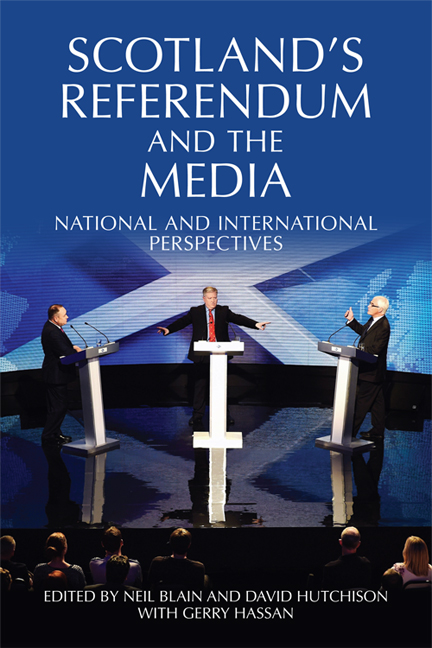Book contents
- Frontmatter
- Contents
- Preface
- Part One The Referendum in Scotland
- 1 The Unexpected Campaign
- 2 The Media Landscape in Scotland
- 3 Broadcasting and the Press: Some Key Moments
- 4 Scotland's Changing ‘Community of the Communicators’: The Political Commentariat and the Independence Referendum
- 5 The Scottish Press Account: Narratives of the Independence Referendum and its Aftermath
- 6 Scottish TV Coverage of the Referendum Campaign from September 2012 to September 2014
- 7 ‘Liked’, ‘Shared’, Re-tweeted: The Referendum Campaign on Social Media
- 8 Sport, Gender and National Identities
- Part Two Views from the UK
- Part Three International Perspectives
- Notes on the Contributors
- Index
7 - ‘Liked’, ‘Shared’, Re-tweeted: The Referendum Campaign on Social Media
from Part One - The Referendum in Scotland
Published online by Cambridge University Press: 05 August 2016
- Frontmatter
- Contents
- Preface
- Part One The Referendum in Scotland
- 1 The Unexpected Campaign
- 2 The Media Landscape in Scotland
- 3 Broadcasting and the Press: Some Key Moments
- 4 Scotland's Changing ‘Community of the Communicators’: The Political Commentariat and the Independence Referendum
- 5 The Scottish Press Account: Narratives of the Independence Referendum and its Aftermath
- 6 Scottish TV Coverage of the Referendum Campaign from September 2012 to September 2014
- 7 ‘Liked’, ‘Shared’, Re-tweeted: The Referendum Campaign on Social Media
- 8 Sport, Gender and National Identities
- Part Two Views from the UK
- Part Three International Perspectives
- Notes on the Contributors
- Index
Summary
In the months leading up to 18 September 2014, social media were set ablaze by the polarised debate surrounding the Scottish referendum on independence. While the benefits of social media as platforms for political campaigning had been recognised for several years, the referendum debate on Facebook and Twitter was notable for the high level of public participation and activity. The competing Yes Scotland and Better Together official campaigns were joined on Facebook and Twitter by a number of pages and accounts established by groups which mostly favoured Scottish independence. Some of these were aligned to political parties such as the Scottish Socialist Party, the Green Party and the Scottish Labour Party (Labour for Independence). Others were established by issue-focused groups, such as Women for Independence/Independence for Women. Public participation in the independence debate on Facebook and Twitter was so extensive that on 10 December 2014 it was announced that the Scottish referendum was the UK's most discussed subject on Facebook, and one of the most featured topics on Twitter.
Debate on Scotland's future did not end on 18 September, however, but was continuing on social media even as 2014 drew to an end. Post-referendum activity, particularly on Facebook, suggested that those Scots who had supported the Yes campaign had no intention of bringing the debate to an end. This chapter looks at debate on Facebook and Twitter before and after polling day.
By 2014, the use of social media as vehicles for political communication was securely established: Facebook and Twitter were successfully deployed by Barack Obama during his 2008 campaign for the presidency of the USA and comprehensively used in the 2010 UK general election. Social media allow politicians – as well as private individuals and special interest groups – total control over their self-representation and the content and initial dissemination of their campaign messages. Referendum campaigning on Facebook and Twitter began more than two years before Scottish voters went to the polls. An early start is a significant factor on social media, as it enables campaigns to have an established profile online, to begin disseminating messages and to build a strong support base well before the immediate pre-poll period; UK politicians and parties adopted the same tactics in preparation for the 2010 general election.
- Type
- Chapter
- Information
- Scotland's Referendum and the MediaNational and International Perspectives, pp. 70 - 82Publisher: Edinburgh University PressPrint publication year: 2016



